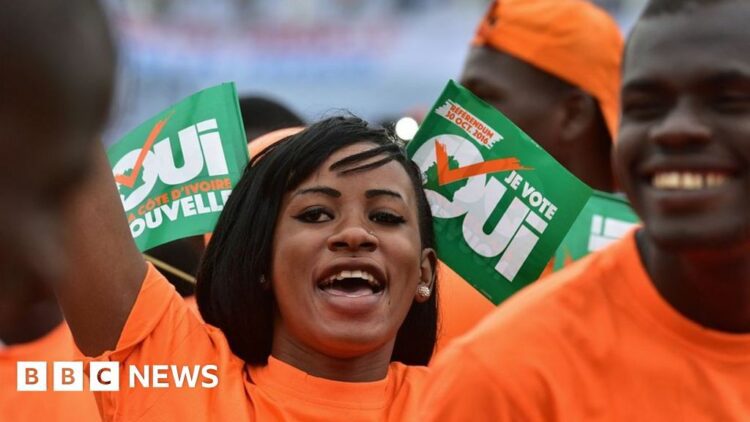By Lamine KonkoboBBC Africa
28 October 2016
Image caption, Ouattara’s supporters have been vocal in backing the constitutional reform process
The people of Ivory Coast are going to the polls on Sunday to approve or reject a draft constitution which the government says will address the question of identity which has been at the heart of years of unrest.
The draft constitution was adopted earlier this month by the National Assembly but opposition parties have called for a boycott, as they say the country already has one of the best constitutions in Africa.
They also accuse President Alassane Ouattara of using it as a way of trying to nominate his successor.
What is the most important change?
Image source, ISSOUF SANOGO
Image caption, Critics say changes will help Mr Ouattara to stay in the presidency
The most important change is contained in an article that removes the age limit of 75 and scraps the requirement that both parents of presidential candidates must be native-born Ivorians.
President Ouattara, 74, will be over the current age limit at the end of his current term.
Initially, some of his critics accused him of trying to stay in power himself but the draft retains a ban on third terms, so he cannot seek re-election.
The new nationality rules are also intended to remove the concept of “Ivoirite” from the constitution.
What is ‘Ivoirite’?
The concept was initially forged in the 1940s in academic and student circles to promote national pride and identity.
But in the years following the death in 1993 of Houphouet Boigny, the country’s first post-independence president, the concept was hijacked and turned into a political weapon against opponents of President Henry Konan Bedie.
Image caption, Ivory Coast was relatively stable and prospered economically under Felix Houphouet-Boigny’s three decades in power
From then on, “Ivoirite” was used to stress ethnic and religious differences between natives of the West African state, setting subjective criteria for who can be considered to be “genuinely” Ivorian.
Many northerners, who are mostly Muslims and from the Dioula ethnic group, felt the concept was being used to politically marginalise them.
In 1999, Mr Ouattara, a Muslim and a Dioula, was banned from standing in the presidential race on the grounds that his parents came from Burkina Faso, which he denies.
That led to a flare-up of social and political tension, and soon Ivory Coast experienced its first military coup, and then a civil war which led to a north-south split of the country.
Image caption, The divisive issue of “Ivority” plunged Ivory Coast into a decade-long civil war
Mr Ouattara won the presidential election in 2010 but his opponent President Laurent Gbagbo refused to stand down, sparking months of conflict.
Pro-Ouattara forces, backed by France, eventually won and he promised to resolve the issue of “Ivoirite” once and for all.
He has billed his constitutional reform as an opportunity for Ivory Coast to turn the page after many years of strife and instability.
Why is nationality such a hot topic in Ivory Coast?
Nationality in Ivory Coast is not just important in connection with eligibility criteria of presidential candidates.
Within West Africa, Ivory Coast is a relatively prosperous country, with its coffee and cocoa plantation attracting migrants from neighbouring countries such as Mali, Burkina Faso and Niger, many of whom were Muslims.
While he was in power, Mr Houphouet Boigny encouraged migration from neighbouring countries.
While Ivory Coast had a need for cheap and unqualified labour, many Ivorians, especially in the more Christian south, were resentful of the new immigrants.
Beyond the eligibility criteria
The new construction also introduces:
A Senate which will form the country’s law-making body alongside the existing National AssemblyThe position of a vice-president A new chamber for traditional chiefs to recognise their importance to the country.
Why is there opposition to the reforms?
Image source, ISSOUF SANOGO
Image caption, There have been restrictions on those seeking to stage protests against the new constitution
There are two main parties who are opposed to the new constitution:
The former ruling party, Laurent Ggbabo’s FPI, which says the current constitution is one of the most modern constitutions in Africa. The FPI argues that the reform is a political gimmick and a total waste of time.The Liberty and Democracy for the Republic (Lider) party, a splinter of the FPI. Lider’s Mamadou Koulibaly says it does not address what Ivoirians are really asking for. For him, Ivory Coast needs a shift to a parliamentary regime. Image caption, The draft constitution was adopted by a landslide majority of Ivorian MPs
What are the chances of the reform being approved?
The opposition has called on voters to boycott the referendum, meaning it is likely to pass by a landslide.
There is no minimum turnout requirement.
Source link : https://www.bbc.com/news/world-africa-37693120.amp
Author :
Publish date : 2016-10-28 07:00:00
Copyright for syndicated content belongs to the linked Source.
